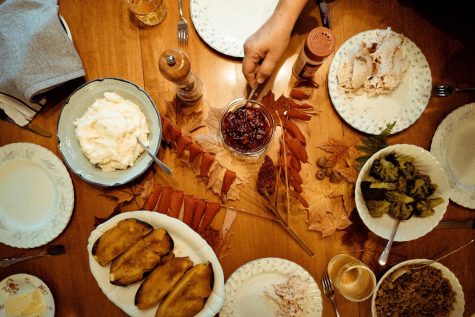Tips and tricks for a more sustainable holiday season
For many Americans, December is full of holiday traditions: urban homes framed with lights become gingerbread villages, loved ones gather over food and drinks, the scent of pine seems to drift on the wind, but all is not as it should be this month. It turns out that while America is caught up in the thrill of the holiday season, our planet is taking the brunt of the damage.
While the holidays may boost moods, they also boost waste. According to the Center for Disease Control and Prevention, on average, Americans create 25 percent more trash during the month of December. Fortunately, by making a conscious effort to implement a few changes this season, Americans can stop feeling guilty about waste, and get back to feeling good about being with family and friends.
Gifts are a big part of the holiday season and so is wrapping paper. Americans are spending upwards of $7 billion per year on this decorative tradition. Worse still, it turns out that a lot of gift wrapping materials such as bows, ribbons, metallic, glittery paper, and especially small scraps, should not be recycled. There are still ways to decorate and disguise gifts, though, without wasting so much.
First, there are wrapping paper alternatives. Gifts can be packaged in newspaper, cloth, blankets and even items of clothing. However, having a Christmas tree that resembles a laundry hamper or handing Grandma a box of chocolates wrapped in Trump’s face and yesterday’s headline might not be easy to stomach. If so, try buying paper specifically designed to be recycled and skip the bows and ribbon altogether.
Gift bags are another option since these are more often reused and can fit multiple items in one package. Regardless of wrapping medium, be mindful to use only the material needed to conceal the package and make sure the scraps end up in the right bin.
Other decorations can be harmful to the environment as well. The results of a NASA study published in 2014 displayed that nighttime brightness increased by up to 50 percent around Christmas and New Year’s. With electricity usage accounting for 28 percent of greenhouse gas emissions, this is bad news for the environment. In addition, light pollution can disrupt the natural routines and safety of wildlife that rely on light and dark cycles to survive.
If lights are a must, choose LED over incandescent. LEDs use 75 percent less energy than incandescent bulbs. While LEDs can sometimes be brighter than incandescents, it is possible to buy dimmable LED Christmas lights which will be better in terms of both a carbon footprint and the health of local wildlife.
If any excuse to keep the ladder and tangle of wires in storage is enough to ditch the lights, though, there are plenty of other ways to decorate sans the electricity spike. Natural decorations are fun and easy to make, can be just as beautiful as store-bought, and can be composted come January.
Pine bows can be used to spruce up a picket fence or front door, and pine cones coated in nut butter and seeds serve the dual purpose of decorating and bringing birds (and probably squirrels) to the yard.
Take inspiration from UMass Amherst dining and fill mason jars with water and cranberries and place on tables or window sills to give rooms that all-natural holiday feel. Complement with beeswax candles and December is cozier than ever.
Of course, the holidays would be nothing without the gathering of family and friends, but winter parties can be a source of much waste. Going back to that 25 percent increase in waste production during the holiday season, parties often mean trash cans heaped with paper plates, cups and cans, and leftovers.
A sink full of dirty dishes might seem like a nightmarish hassle at the end of a long night of socializing, but with 2.5 million tons of disposable cups and plates accruing in trash cans each year, reusable is the way to go.
Since even paper plates can’t be recycled once they have been contaminated with food residue, try putting out reusable dishware and asking guests to use the same plate and cup all night long.
If invited to a friend’s house or a company party, waste shaming the host probably won’t do much for the holiday spirit. Instead, be conscious of usage. Take only the utensils, cups, plates, and napkins necessary and keep track of them throughout the night to avoid having to pick up a new set for that second serving of sugar cookies.
The holidays should be a time of togetherness and thanks but that should not come at the expense of the planet. This season, be aware of the consequences of many decorative traditions and take advantage of alternatives to keep the holiday spirit alive.
Email Lily Robinson at lerobinson@umass.edu and follow her on Twitter @LilyRob50564485











